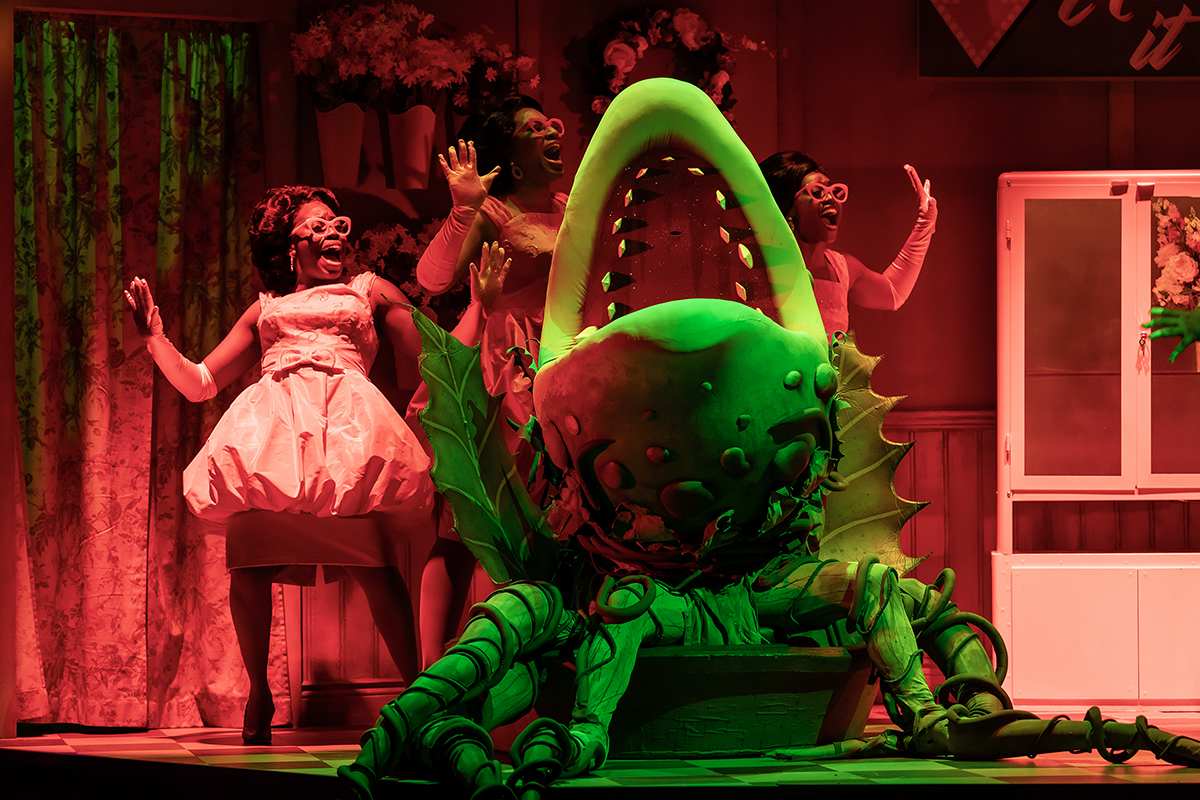Theater Review: Fences at Ford’s Theatre
Craig Wallace and Erika Rose lead a top-notch ensemble through August Wilson's Award-winning masterpiece

A symphony of drama in several movements, August Wilson’s Fences (★★★★☆) rises, falls, and rises mellifluously. In Timothy Douglas’ astute new production at Ford’s Theatre, Wilson’s Pulitzer Prize-winning text supplies the moving range of emotional notes that tell the story of trash collector Troy Maxson (Craig Wallace) and stalwart wife Rose (Erika Rose) struggling to hold their family together in racially segregated 1950s Pittsburgh.
The company’s approach seems to be about setting in motion a sound, credible vehicle for Wilson’s full-bodied language and nimble plotting, then getting out of the way of a good thing. There’s nothing showy about the design or presentation. Scenic designer Lauren Halpern’s realistic row-house and mostly bare backyard are backed by a photographic backdrop that just subtly suggests the vibrant but crumbling, low-income black neighborhood the Maxson family calls home.
While the Maxson’s brick house looks solid, it also appears to be shoved up against the Ford’s box Lincoln was shot in. That might be a comment on urban overcrowding, or a cramped use of the stage. The pacing of characters’ entrances and exits through and around the Maxsons’ steadily growing fence is more effective at defining the family’s place in the world. The running visual joke of Troy’s money-grubbing musician son Lyons (KenYatta Rogers) bopping in past the fence every payday, or the tendency of aspiring athlete son Cory (Justin Weaks) to streak out of the yard and off into the distance, expertly accentuate the performances. Such grace notes constitute the something extra that helps drive home the meaning in each moment.
The action onstage, evocatively lit by Andrew R. Cissna, revolves around Troy, portrayed by Wallace as a boisterous, braggadocious bear of a man, who takes care of his family yet is probably a disappointment to himself. This Troy is not as intimidating as he could be. He can be hurtful and cruel, but he comes off not as mean, just bitter. He charms to hide that potent bitterness, except when he unleashes it as a weapon, usually in the direction of one of his sons. The charm, he expends on Rose, whom he teases and hits on and outwardly respects, at least by handing over his pay every Friday for her to manage the household income.
As Rose, Erika Rose stands tall as one of the two pillars of a towering play. Her Rose gives as good as she gets, but only when she judges the moment right to put in the effort. She doesn’t rebuff her husband’s lusty advances, and leans into his attention, but the performance signals a vague disconnect between Mr. and Mrs. Maxson.

Doug Brown is slyly observant, folksy, and funny, if not always on-cue, as Troy’s best buddy and fellow garbageman Jim Bono. Bono knows Troy and Rose well enough to also notice the disconnect in their marriage. Perhaps a minor player when considered in the larger context of Wilson’s century-spanning, ten-play Pittsburgh Cycle, Jim Bono still stands out as a sterling example of true friendship. Brown is at his best in the scene where Jim is bold enough to reproach Troy, but gingerly, about whether or not Troy’s stepping out on Rose with another woman.
This symphony allows for a spotlight solo from each player, as well as various engaging duets, in harmony and discord — between Rose and Cory, and half-brothers Cory and Lyons, and Troy and his mentally ill, war vet brother Gabriel (Jefferson A. Russell). Some solos and suites register more strongly than others. Or, in terms that reflect Troy’s history as a former Negro Leagues pro, each player gets their turn at bat, resulting in doubles, triples, a whiff or two (as in one particularly unreadable, wordless interlude featuring Rose), and a good share of homeruns.
What matters is the team effort, which succeeds at connecting the generational dots Wilson plots throughout the Maxsons’ back yard, and across decades of history. A mother’s love and resignation, a father’s shame and rage, a nation’s original sin, all visited on a younger generation that can’t fix the past or clearly foresee a hopeful future, add up to create a recipe for penetrating drama.
Fences runs through October 27 at Ford’s Theatre, 511 Tenth St. NW. Tickets are $17 to $72. Call 888-616-0270, or visit www.fords.org.
Support Metro Weekly’s Journalism
These are challenging times for news organizations. And yet it’s crucial we stay active and provide vital resources and information to both our local readers and the world. So won’t you please take a moment and consider supporting Metro Weekly with a membership? For as little as $5 a month, you can help ensure Metro Weekly magazine and MetroWeekly.com remain free, viable resources as we provide the best, most diverse, culturally-resonant LGBTQ coverage in both the D.C. region and around the world. Memberships come with exclusive perks and discounts, your own personal digital delivery of each week’s magazine (and an archive), access to our Member's Lounge when it launches this fall, and exclusive members-only items like Metro Weekly Membership Mugs and Tote Bags! Check out all our membership levels here and please join us today!
























